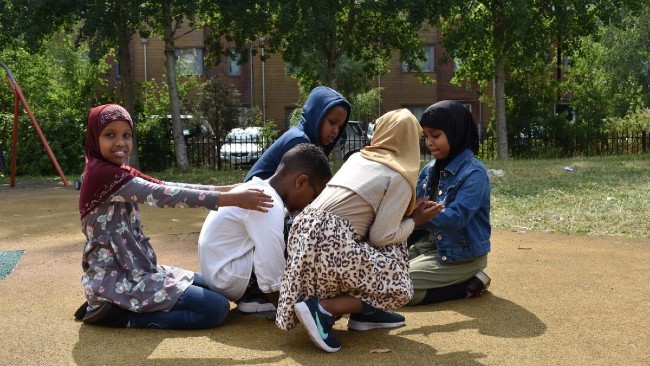Improving outcomes for young children in refugee families: lessons from Somali parents’ experience of play and social interaction opportunities in the UK
Our findings show how disadvantage can impair early child development in migrant families. Social isolation and lack of safe places to play are key points to address.
Young children need opportunities for play and social interaction to develop and socialise confidently.
Delayed and disordered early development can lead to poorer wellbeing, lower chance of employment and higher risk of crime.
Migrants from cultures where ‘it takes a village to raise a child’ may find it challenging to bring up children in urban, western contexts without their supportive social networks and often with highly stressful circumstances.
Their children are at higher risk of delayed and disordered early development, with multiple factors potentially contributing to risks of poor longterm educational and social outcomes.
Somali people are one of the world’s largest diasporas, estimated over 1.2 million, with forced migration from conflict.
The UK has Europe’s largest and longest-established Somali community (4,600 births annually), and in Bristol, Somali children are 5% of the child population.
We asked Somali mothers about experiences of childhood (both their own and subsequent observations) in Somalia and the UK.
In Somalia, they described a supportive, connected community and safe environment enabling children to play and learn together.
In the UK, by contrast, multiple local stresses constrained children’s opportunities to play and interact.

Key Findings
We interviewed six Somali mothers in Bristol, asking their experience of early (pre-school) childhood in the UK and Somalia, and what they saw as facilitating or restricting children’s early opportunities for play, social interaction and
development.
In Somalia, they described:
• the environment creating a structure where children can play and learn
• a sense of safety for children to play and explore outdoors (familiar and trusted neighbours and few hazards, despite the history of armed conflict)
• adults taking responsibility to set boundaries and ensure all children’s safety
• older children keeping watch on younger ones as well as organising their activities.
Overall, despite the conflict in Somalia, this structure of shared understanding and support created a sense of safety and freedom that facilitated play, social interaction, and children’s increasing maturity.
By contrast, in the UK, there were multiple constraints on children’s play and social interaction:
• poor housing with minimal communal space or shared facilities, limiting social interaction or hospitality
• poor access to outside play spaces
• lack of knowledge and language skills to navigate services in the UK
• lack of financial, material and social resources
• Safety fears (traffic, abuse, intervention by authorities) leading to adult supervision for all activities outside.
Policy Recommendations for local authorities
Housing, Planning and Neighbourhood Services
• Provide or enable communal space in local authority housing for families to meet others
• Facilitate local street closures for outdoor play
Improve parks and green spaces by:
• Ensuring child-safe fencing and gates
• Providing sufficient equipment, zoned by age, to sustain children’s attention, and adjacent seating so that parents/carers can meet, and still see their children play
• Providing youth-friendly areas alongside areas for younger children
Early Years Education and Health Services
Tailor statutory early childhood interventions for disadvantaged migrant communities to:
• Reinforce community assets, support networks and communal child-rearing practices, by supporting community groups and activities to help families ‘find your village’
• Help families navigate unfamiliar systems (e.g. housing, benefits, family reunion entitlements)
• Improve access to universal early years services (e.g. Children’s Centres) and English language classes (ESOL)
• Provide accessible public health messages (importance of play, communication, interaction & restricting TV/screen use) in community languages and via community groups
Many of these interventions could be facilitated by community link workers.
‘[in Somalia]…sometimes [neighbours] are family as well…the doors are open… all the neighbours going to watch them… they know where the child is going, helping them to explore by themselves… [grandparents] talk to them, they tell stories. [Children in Somalia] could speak very early, they know everything.’
Policy Implications
Understanding and improving neighbourhood geography, as experienced by parents and children, may help to promote early child development in refugee/disadvantaged migrant families with consequent longterm societal
benefits.
Policies that focus on encouraging parents to talk more with their children may be ineffective if they ignore communal cultural practices and fail to address parental stress and isolation.
The most effective measures for improving outcomes for young people from disadvantaged migrant families are likely to be those that build resilience, social networks and child-friendly communities.
To be most cost effective, interventions should focus on children’s early years, and make these changes as part of ‘alignment’ between related services with similar goals e.g. early years health and education, and/or neighbourhoods,
parks and public health.
Policy Briefing 95: Jan 2021
Improving outcomes for young children in refugee families (PDF, 64kB)
Further Information
‘Like a life in a cage’: Understanding child play and social interaction in Somali refugee families in the UK. Allport, T., Mace, J., Farah, F., Yusuf, F., Mahdjoubi, L. and Redwood, S., 2019. Health & Place. 56,191